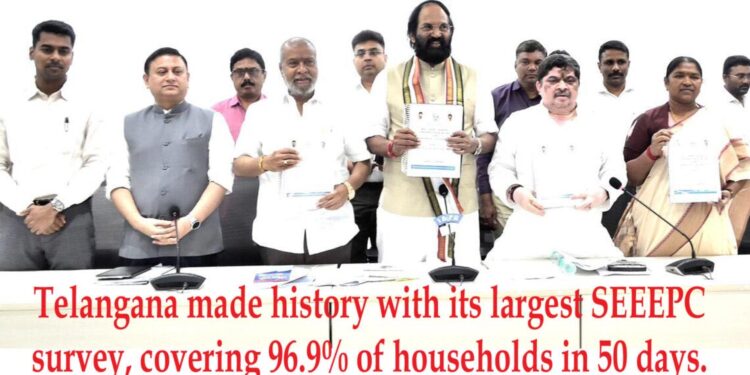Hyderabad, February 2: Telangana has successfully completed a massive Socio-Economic, Educational, Employment, Political, and Caste (SEEEPC) survey, covering 96.9% of the state’s households in just 50 days.
The entire process, from the initial cabinet resolution to the submission of the final report, was completed in exactly one year. This initiative fulfills a key electoral promise made by Congress leader Rahul Gandhi during the 2023 Telangana Assembly elections and is expected to play a crucial role in shaping welfare policies based on real-time socio-economic data.
The Cabinet Sub-Committee, chaired by Irrigation and Civil Supplies Minister Capt. N. Uttam Kumar Reddy, formally received the survey reports from the Planning Department, which led the data collection exercise. At a high-level meeting, ministers Uttam Kumar Reddy, D. Seethakka, Ponnam Prabhakar, and Damodar Raja Narasimha reviewed the findings alongside senior officials, including Principal Secretary (Planning) Sandeep Kumar Sultania and Hyderabad Collector Anudeep Durishetty. The Planning Department made a detailed presentation on the methodology and outcomes of the survey.
Speaking at a press conference, Uttam Kumar Reddy described the initiative as a milestone in governance and social justice, stating that the findings would help restructure welfare programs and ensure equitable resource distribution for Backward Classes, Scheduled Castes, Scheduled Tribes, and other marginalised communities.
The survey, conducted with the assistance of 94,863 enumerators and 9,628 supervisors, covered a total of 3,54,77,554 individuals. The Centre for Good Governance developed the digital infrastructure to ensure efficient execution, and a total of 76,000 data entry operators digitised the information within 36 days. The first respondent was Telangana Governor Jishnu Dev Varma, who officially launched the survey on November 9, 2024. The demographic breakdown revealed that Backward Classes accounted for 1,64,09,179 people (46.25%), Scheduled Castes for 61,84,319 (17.43%), Scheduled Tribes for 37,05,929 (10.45%), and the total Muslim population stood at 44,57,012 (12.56%), including 35,76,588 (10.08%) BC Muslims and 8,80,424 (2.48%) OC Muslims. Other OCs accounted for 44,21,115 (13.31%), making the total OC population 15.79%. The data will now be used to refine government welfare schemes, improve job opportunities, and ensure targeted support for vulnerable communities.
Despite its scale and speed, the survey faced multiple challenges, including misinformation campaigns, legal hurdles, and logistical issues. Public Interest Litigations (PILs) were filed against the survey, but the High Court ruled in favour of the government, allowing the process to continue. On the ground, 1.03 lakh houses were found locked, 1.68 lakh families initially hesitated to participate, and 84,137 houses were misclassified due to non-residential usage or occupants being non-Telangana residents. The government responded by conducting awareness campaigns and field visits to maximise participation and ensure data accuracy.
Comparing Telangana’s effort with Bihar’s caste survey, Uttam Kumar Reddy pointed out that while Bihar took six months and spent Rs 500 crore, Telangana completed its survey in just 50 days at a significantly lower cost. He credited this achievement to meticulous planning, decentralised implementation, and continuous monitoring by Chief Minister A. Revanth Reddy, Deputy CM Bhatti Vikramarka, and Chief Secretary Santhi Kumari. Twelve high-level review meetings were conducted, with CM Revanth Reddy personally leading three of them. The survey report will be presented before the Telangana Cabinet on February 4 at 10 AM, followed by a discussion in the Assembly on the same day.

BC Welfare Minister Ponnam Prabhakar called the initiative a golden chapter in Telangana’s history, emphasising that despite attempts to mislead the public, people actively participated, demonstrating their trust in the government. He recalled that on February 16, 2024, he had moved the Assembly resolution for this survey and expressed pride in its timely completion. He said this initiative aligns with Rahul Gandhi’s vision of equitable resource distribution and would serve as a model for the entire country.
Health Minister Damodar Raja Narasimha described the survey as a difficult but honest effort to ensure social justice, stating that despite legal challenges, the government remained committed, and the results would help shape policies that empower the most disadvantaged communities.
Tribal Welfare Minister D. Seethakka called the initiative historic and beneficial to all communities in Telangana, suggesting that similar surveys should be conducted nationwide.
Uttam Kumar Reddy emphasised that this is just the beginning and that Telangana has set an example for data-driven governance. He said this survey is not merely a data collection exercise but a revolution in social justice, ensuring that the most vulnerable sections of society receive the benefits they deserve. He asserted that the findings would refine welfare schemes, improve job opportunities, and uplift weaker sections, proving that Telangana is capable of executing large-scale, data-driven policies for the greater good. He also thanked Rahul Gandhi for his vision and Chief Minister Revanth Reddy for his leadership in executing this ambitious initiative. Calling it a historic day for Telangana, he said the survey will stand as a model for achieving social justice across the nation and extended his congratulations to the entire team for their dedication and hard work. With Telangana setting a new benchmark in large-scale data collection, this survey is expected to serve as a blueprint for other states, ensuring equitable governance and data-driven decision-making.










